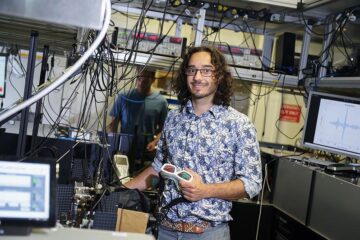International Congress of Nanobiotechnology & Nanomedicine 2006

You are cordially invited to participate in the International Congress of Nanobiotechnology & Nanomedicine (NanoBio 2006).
We are pleased to present a faculty of distinguished speakers and experts from around the world focusing on the state-of-the-art scientific development, as well as business and investment opportunities in the emerging field of Nanobiotechnology & Nanomedicine industry.
We are pleased to welcome our key note speaker:
The Honorable Victoria Bradshaw
Secretary of the State of California Labor & Workforce Development Agency
who will speak at the NanoBio 2006 on Tuesday June 20, 2006 at 8:45 AM
Early-bird registration will end on May 26, 2006. Register now and save!
TOPICS:
Targeted nano delivery systems for drugs and genes
Minimally invasive diagnostic methods
Nano Bio Structural Modeling
Regenerative Nanomedicine
Nanobiological assemblies
In vivo medical imaging
Bio-detection
Nanopatterning
Nanotoxicology
Standardization
Regulatory
Investment in NanoBio emerging companies
other related topics
Speaking Opportunity at the Nanobio2006
If you are interested in a speaking opportunity at an upcoming Nanobio2006, please complete the following form http://www.ianano.org/speaking.htm
Abstract submission deadline has been extended to accommodate the latest findings in this exciting field:
http://www.ianano.org/abstract-online.htm
Register Now: http://www.nanotechcongress.com/registration.htm
Partial List of Invited Lectures:
We are pleased to welcome our key note speaker:
The Honorable Victoria Bradshaw
Secretary of the State of California Labor & Workforce Development Agency
The State of California
Sacramento, California USA
Prof. Stephen Y. Chou
Department of Electrical Engineering
Princeton University, Princeton NJ, 08540, USA
„Nanoimprint Lithography for Protein/DNA Analysis“
Prof. T. Vo Dinh
Director
Fitzpatrick Institute for Photonics
Duke University, Durham, NC 27705-0281, USA
„Nanosensors and Nanoprobes:Challenges and Potential at the Frontiers of Biology and Medicine“
Dr. John Howard
Director
National Institute for Occupational Safety and Health
200 Independence Avenue, S.W.
Washington DC, USA
„Nanotechnology and Risk: The NIOSH Perspective“
Dr. Clémence Labat
Micro & Nanotechnologies for Life Sciences and Chemistry, Yole Développement
45 rue Ste Geneviève, Lyon, FRANCE
„The impact of Nanotechnologies in the Life Sciences field“
Prof. Byung Kyu Kim
Pusan National University
30 Jangjeon-dong, Geumjeong-Gu
Pusan, SOUTH KOREA
“Thermosensitive Poly (NIPAAm)/Polyurethane IPN Hydrogel for Drug Delivery”
Prof. Amarnath Maitra
Department of Chemistry
University of Delhi
Delhi 110 007, INDIA
“New Challenges In Gene Delivery”
Prof. Venkatesan Renugopalakrishnan
Harvard Medical School
65 Knowlton Circle
Upton, MA 01568 USA
“Bionano Devices: Protein-based Memory”
Dr. Avijit Roy
Immunicon Corporation
3401 Masons Mill Rd,
Huntingdon Valley, PA 19006 USA
Edward Tefft
Associate Director, Process Technology
Elan Drug Delivery, Inc.
King of Prussia, PA, USA
„Commercial Applications of NanoCrystal™ Drug Delivery Technology”.
Dr. Takehiko Wada
Department of Applied Chemistry
PRESTO,JST&Fac. Eng. Osaka University
2-1, Yamadaoka, Suita, Osaka 565-0871, JAPAN
„Peptide Ribonucleic Acids (PRNAs): Novel Strategy for Active Control of DNA Recognition by External Factors“
More than 70 other distinguished speakers are listed on our web site: http://www.ianano.org
If you have any questions, please contact:
Lorraine Bazzell
International Association of Nanotechnology
2386 Fair Oaks Blvd
Sacramento, CA 95825 USA
Email: info@ianano.org
Media Contact
Weitere Informationen:
http://www.nanotechcongress.com http://www.nanotechcongress.com/registration.htm http://www.ianano.orgAlle Nachrichten aus der Kategorie: Veranstaltungsnachrichten
Neueste Beiträge

Neue universelle lichtbasierte Technik zur Kontrolle der Talpolarisation
Ein internationales Forscherteam berichtet in Nature über eine neue Methode, mit der zum ersten Mal die Talpolarisation in zentrosymmetrischen Bulk-Materialien auf eine nicht materialspezifische Weise erreicht wird. Diese „universelle Technik“…

Tumorzellen hebeln das Immunsystem früh aus
Neu entdeckter Mechanismus könnte Krebs-Immuntherapien deutlich verbessern. Tumore verhindern aktiv, dass sich Immunantworten durch sogenannte zytotoxische T-Zellen bilden, die den Krebs bekämpfen könnten. Wie das genau geschieht, beschreiben jetzt erstmals…

Immunzellen in den Startlöchern: „Allzeit bereit“ ist harte Arbeit
Wenn Krankheitserreger in den Körper eindringen, muss das Immunsystem sofort reagieren und eine Infektion verhindern oder eindämmen. Doch wie halten sich unsere Abwehrzellen bereit, wenn kein Angreifer in Sicht ist?…





















